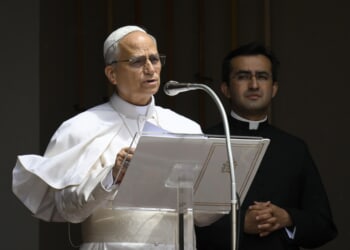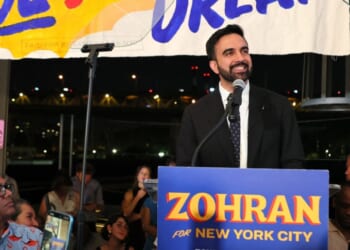As the director of operations at The American Spectator, I have had the incredible fortune to get to know its founder and editor-in-chief, R. Emmett Tyrrell Jr., known as Bob to his friends and colleagues. Given the long shadow that The American Spectator has cast on the conservative movement since its founding nearly 60 years ago and the larger-than-life, sui generis persona of its founder, I was thrilled to have the opportunity to interview Robert Orlando, the director of the first-ever documentary about The American Spectator.
The film Surviving the Kultursmog: R. Emmett Tyrrell, Jr. and the Rise of The American Spectator was inspired by the soon-to-be-released book The History of The American Spectator, authored by Paul Kengor, Tyrrell’s handpicked successor. Orlando and Kengor are long-time collaborators, most notably on the film The Divine Plan (2019), which examined President Ronald Reagan’s relationship with Pope John Paul II.
I recently sat down with Rob on the set of Surviving the Kultursmog to discuss what inspired him to bring the story of The American Spectator and that of R. Emmett Tyrrell Jr. to the big screen. (RELATED: Surviving the Kultursmog: R. Emmett Tyrrell Jr. and the Rise of The American Spectator)
Here is a summary of our Q&A.
Cravotta: What motivated you to create a documentary about the history of The American Spectator?
Orlando: I was drawn to this project for the same reason I pursue most of my work: because I sensed a deeper story hiding just beneath the surface. The American Spectator is more than a magazine—it’s a cultural barometer, a gladiatorial arena where wit and ideology sparred in print. But history has a way of forgetting the satirist behind the curtain. In Bob Tyrrell, I saw the chance to recover a vanishing archetype: the gentleman provocateur, a Midwestern oracle in martini form. It felt like time to rescue that legacy — from caricature, from dismissal — and render it successful but yet a cautionary tale. One that intersects with the arc of American conservatism and the shifting fault lines of media power.
Cravotta: What is the meaning of the title? What is the Kultursmog?
Orlando: Kultursmog? To me, it’s the pervasive haze of ideological overreach — especially from liberal institutions — that uses censorship, media, and academic orthodoxy to suppress dissent, distort reality, and fog the average citizen’s ability to think clearly and independently. Surviving the Kultursmog really reflects what the film is about. For me, it’s a nod to how Bob Tyrrell and The American Spectator have been fighting back against the cultural fog that clouds so much of today’s media. The “smog” symbolizes that overwhelming mix of liberal biases and distractions, and the title itself cuts through all that to get to the heart of the conversation. The fact that Bob has always battled the extremes of the left and The American Spectator is a reflection of that war!
Cravotta: What is unique about Bob Tyrrell’s story?
Orlando: He isn’t just a man of letters — he’s a man of combat. He turned prose into a sword. Tyrrell never settled for merely editing a magazine; he built a cadre of insurgents, a court of cultural dissidents. While others were campaigning, he was curating. While others were lobbying, he was lobbing satire like grenades. His genius wasn’t only in what he wrote, but in who he championed. He spotted voices before the world knew they mattered. And yet, ironically, his own story remains largely untold. That’s what pulled me in: a man of faith who gave so many others a voice is now the one who most deserves to be heard.
Cravotta: What aspects of the story are universally relatable?
Orlando: The drive to shape culture rather than be shaped by it — that’s something every artist, dissenter, or thinker wrestles with. Tyrrell’s arc speaks to what it means to live just outside the mainstream long enough to watch it turn back on itself. And there’s something undeniably human in his contradictions: elegance wrapped in defiance, old-world manners cloaking iconoclast instincts. In many ways, he reflects everyone who’s tried to hold on to principle while the world chased fashion. His story is about legacy, vision, and the very real cost of both.
Cravotta: How are you addressing the dual challenge of illustrating the history of the publication while also conveying its present-day relevance?
Orlando: We’re treating the film as a layered narrative — what I sometimes call “documentary chiaroscuro.” Through archival footage, stylized graphics, and present-day interviews, we move back and forth — past to present, myth to memory. The American Spectator was very much a product of its time, but it also saw where the culture was headed. The fragmentation we live in today, the decline of satire as sharp political weaponry (think H.L. Mencken), the merging of journalism and spectacle — The American Spectator was already playing in that space. This isn’t about nostalgia. It’s about seeing clearly, in full relief.
Cravotta: How would you describe the audience for the documentary?
Orlando: Anyone who’s ever questioned the power of the pen — or the cost of using it. Yes, readers who know the history of American media or the conservative movement will find plenty here. But this film is just as much for the everyman (can’t correct this for gender out of respect for Bob) or curious outsider: the disenchanted journalist, the political apostate, the young thinker still looking for a compass in the fog. It’s for people tired of political talking points and noise and hungry for narrative — something with depth, with weight. The kind that matters, the kind that stays with you.
Cravotta: What message or feeling do you want viewers to experience in watching the documentary?
Orlando: I want viewers, without considering political positions, to feel like they’ve stumbled onto something half-forgotten and quietly sacred — the unspoken truths behind very public battles. That strange feeling of wonder and maybe sadness, watching an era fade into myth. This film isn’t just about one man or one publication. It’s about understanding the deeper forces at play — and the echoes they leave behind. My hope is that it creates a resonance, a kind of cinematic aftereffect or valued story that lingers well after the “red carpet” lights go up, something the next politician or policy wonk will never do.
Cravotta: What else do you want to share with our readers?
Orlando: People often ask if I choose these stories, or if they choose me. Honestly, they tend to find me first. They stir something before I even fully understand why. I don’t go after them with certainty — I go with instinct. Along the way, I try to turn all that complexity into clarity — not by simplifying, but by shaping it dramatically and maybe poetically. I’ve spoken at the Vatican and the White House. I’ve told stories of saints and revolutionaries, Apostle Paul, Patton, Reagan, and Marx. Tyrrell’s story? It floats somewhere in between (I told Bob he would be my subject for a biography between Marx and Washington — deal with that). And maybe that’s what makes it so unmistakably American.
Cravotta: Okay, I am still grappling with the spectrum of Marx to Washington. This looks like a good place to conclude.
Just a note to our readers, this is the first in a series of interviews about Surviving the Kultursmog. Rob, you and I are going to do this again soon.
Orlando: I look forward to it! Thank you, Leonora.
For more information about Kultursmog, visit https://www.kultursmogfilm.com/.













